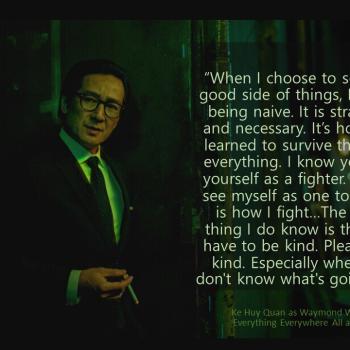Imagine three situations that come up in real life:
1) You are made aware in the local news that lives were lost in a fire that could have been prevented if a recent safety inspection had been as thorough as it ought to have been.
2) You read on a blog about human trafficking in Thailand.
3) Someone serves you a salad with dressing on top. The dressing needs to be stirred, and yet the salad fills the bowl, so that if you attempt to stir it, lettuce and other vegetables will inevitably fall out of the bowl.
 Let’s be honest. Of these three, which is most likely to cause our blood to boil? I suspect that most of us would answer three. Our degree of aggrivation about something like this, or the slightly slow driver in front of us, tends to be far greater than in the case of serious injustices or genuine tragedies. We get upset about minor things that affect us directly, more than about major things that affect others in ways we can scarcely imagine.
Let’s be honest. Of these three, which is most likely to cause our blood to boil? I suspect that most of us would answer three. Our degree of aggrivation about something like this, or the slightly slow driver in front of us, tends to be far greater than in the case of serious injustices or genuine tragedies. We get upset about minor things that affect us directly, more than about major things that affect others in ways we can scarcely imagine.
Christianity historically spoke about the fallenness of human nature. Rabbinic Judaism spoke of good and evil impulses. In light of the best scientific understanding of human beings available, it is better to talk about our evolutionary heritage and our instincts. It is not clear that any other beings on this planet can reflect in the way humans can about those instincts, and can decide that some instincts should not be followed for moral reasons. For us humans, however, it is possible to reflect on our instincts, and in this case to identify an underlying selfishness behind our reactions to different scenarios. And even if we cannot eliminate the instinct (indeed, as Rabbinic Judaism maintained, the “evil impulse” was necessary for life, and was only evil when it wasn’t kept in check), we can decide to reject the instinctual response and adopt a different one.
In demythologized or updated form, the religious perspective offers something important, I believe. It draws to our attention that there are instincts that will lead us to certain ends if we follow them, and it further emphasizes that humans who have chosen to cultivate a morality that at times overrides those instincts have found the resulting approach to life far more rewarding, satisfying and fulfilling than the alternative.
That doesn’t give us moral absolutes. As I’ve posted before, even positing the existence of God doesn’t seem to help. It gives us an eternally-existing person (or three persons in one substance, perhaps) with moral views. It may provide for punishment of those who do not submit to the deity’s morals. But is there any sense in which that allows one to demonstrate that what God wills is good? Perhaps morality is like taste: It is not something one can prove, but it is something one can cultivate by exposure to diverse cultures and experiences. And in the process we can find principles on which we feel we must stand firm, even if they cannot be proven, while also realizing that others who seem to likewise be pursuing goodness may disagree with us on how to best achieve it.
This is, at any rate, an important issue. Absolutist claims often lead to troubling actions and seem ready to make that which seems evil to us into good and vice versa with a simple “God wills it”. Relativism seems to provide no basis for standing up to injustice – or dealing with the salad issue, for that matter, since the chef’s moral judgment may have been that the bowl-salad proportions were exactly right. And so in particular for those of us who wish to reclaim the outlook of being liberal with conviction, of finding a middle way between the extremes, figuring out what it means to evaluate moral matters from our fallible human standpoint is a crucially important issue.
















